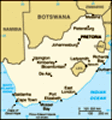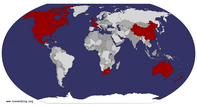Advertisement
Published: September 10th 2015
Having been in South Africa for almost two months I wanted to give some general reflections on the culture from my perspective. I love this country and have married into a large South African family so these things are not criticisms. Instead they should be seen as my observations of a different society with different ways of doing things to my home.
On Greeting People I have noticed that South Africa is a much warmer country in terms of greeting people. Whilst the British are reserved and feel a hearty handshake will do, if indeed contact is absolutely necessary, many people here will greet even total strangers with a hug. Friends always hug when they get together. This is true even for men with their male friends and relatives. There are some friends back home I couldn't imagine ever hugging, here though it would be rude not to. a couple of times I've also had complete strangers greet me on the street, even in central Cape Town and they always ask how I am, and expect the same in return. It is lovely but takes some adjustment.
On Food On the surface the
range of foods available in South Africa is very similar to those back home. South Africa produces a wonderful array of meats and fruits and eating here can be a real treat. I particularly love the range and abundance of dried fruits. I have noticed though that the foods here tend to be much sweeter and saltier. This can make some things taste so much better, especially bread, but then sometimes it leaves my mouth feeling weird afterwards.
Related to this, the South African flavour palette is also subtly different - we tend to use slightly different spices in our foods. At first I didn't notice this but over time it has become quite obvious. I sometimes find that a meal won't taste exactly like I expect it to which can be weird but also delightful. Similarly, there seems to be a completely different range of curries so the staples (korma, tikka masala, rogan josh, etc) I know and love in the UK aren't there. Instead there are wonderful Cape Malay flavours And Durban curries.
There is also a much greater use of artificial colours which have been phased out in Britain. As an example, cream soda is
a popular drink here but it is bright green, a shade not found anywhere in nature, rather than the normal clear drink back home. I found this disconcerting but I'm getting used to it.
Where meat is concerned, there seems to be a much greater use of beef than other meats such as lamb and pork. I love beef but sometimes it feels a little limiting. Also, in the UK I had never eaten a beef sausage but all of the sausages here seem to be beef - a hard adjustment to make. It is strange biting into a sausage roll and it tasting very different. There are other meats readily available, such as bok and ostrich, which are much rarer at home.
On Security Security is of real concern to many South Africans due to the high crime rate. The most obvious manifestation of this is the presence of security gates around homes. Every house sits behind a remote controlled electric gate. It took me a little time to adjust to this but now it seems normal.
More concerning to me is that many houses have signs showing that they have subscribed to
an armed response service. These are private security firms, authorised to carry firearms, to protect personal property. This just wouldn't be allowed, or necessary, in the UK.
From a personal security point of view, it feels just as safe to wander around both the suburbs and the city centre as it does in any major city. The townships are different though - here, I feel that we are much more conspicuous and it is obvious we are carrying valuables (e.g. cameras) the like of which many of the residents couldn't hope to own. It is quite rare though to enter the townships if you don't have specific business there.
On Begging One really hard thing to adjust to here is the level of poverty. Everywhere you go there are people begging. Some even come to the gates asking for food. Many people are struggling to house themselves and put food on their tables. Lots of people don't have sufficient education to get a decent job and this can condem them to a life of abject poverty.
I spent some time looking at this problem because it is often difficult to say no to people
but I have never felt comfortable giving money. I found that the official policy of the City of Cape Town is that beggars should never be directly given money. This is especially true, where children are begging. The reasons for this policy are complex but essentially: it doesn't help the people who really need it; it traps people on the streets; and it encourages criminal behaviour and the abuse of vulnerable children. The best thing to do is either to give food or to donate to a homeless charity.
Often, instead of begging, people will find some way to provide a service to you, with the expectation you will pay a small amount for that service. This means that you will find people standing at robots (a.k.a traffic lights) collecting rubbish, telling jokes, or selling fruit, flowers or little trinkets. Alternatively, some people "choose" to be car guards. They will stand around in car parks offering to guard the car and will sometimes help you to find a space or reverse out of a space. It is quite incredible the industriousness of some of these people and the niches they find to fill.
On the Service Culture
Due to the abundance of cheap labour here you tend to find that there is very little self service. At the petrol pump, drivers aren't allowed to pump their own fuel. In the supermarket, shoppers aren't allowed to pack their own bags. Strangely though this often doesn't actually lead to a better experience. There is a tendency for it to be done much more slowly than you could do it yourself. This usually leads to long queues in the supermarket, despite there being dozens of staff standing around.
In restaurants and cafés the service can be variable. We were in a fancy hotel for coffee and the service was dire but then we have also been to tiny cafés with top class service. Generally the pace will be much slower than in the UK or Europe...this is just something to get used to And to learn to enjoy as it gives an opportunity to relax.
On Driving Driving in South Africa is both an absolute pleasure, in a way it no longer is in Britain, and an absolute nightmare.
On the pleasure side: you get these wide open, usually very well surfaced
highways which go on for ever past amazing scenery. Generally, in this setting you get drivers that pull over on the hard shoulder to allow you to pass if they are slower than you. The only real hazard is the ever present threat of animals roaming the road.
On the nightmare side: driving in the cities is harder than anywhere else I've driven. The slip roads are extremely short on the main roads and serve as both entrance and exit - this is quite scary the first few times. Also drivers here leave much less of a stopping distance which can take some getting used to. The road signs are often both more difficult to interpret and more vague than in England and there are sometimes crazy junctions that feel completely wrong to me. The worst is the 4-way stop. These often occur in towns and the city and are really inefficient compared to a roundabout. They can also be somewhat dangerous as they can take priority away from the major road and give it to the smaller road, which is sometimes little more than a diret track.
South Africa has much less stringent emissions standards than the
EU. This can mean that you get engulfed in a cloud of smoke when driving behind other cars. It also means that when you are standing in an underground car park the fumes from some of the cars can be almost choking.
The other thing I have noticed about driving in South Africa is that features that are standard on vehicles in the UK are absent here. I'm not just talking about indicators on taxis.! A couple of times we have run into problems because we left the lights on and drained the battery. The first time wasn't a problem because it push started quickly. The second time, I was parked in an informal car park on top of a grassy bank. The car wouldn't start so the car guard gave me a push down the hill. The engine still didn't catch and now I was in a stream of traffic without any power. It was very nerve wracking. I managed to pull in to the side before I lost all inertia but then I was stuck. I didn't have any communications devices, nor any telephone numbers to ring. Desperately I tried pushing the car backwards and trying to
jump in as it rolled forwards. It must have been quite a sight. I was lucky not to bump the Toyota Corolla in front. Unfortunately I was unsuccessful. Not knowing what to do I sat in the car and prayed. As I opened my eyes a woman in a green uniform knocked on the window and asked if she could help. She called a colleague for me who drove over and jump started the car. As I was sitting there I was worried how much it would cost me as I only had R70 (£3.50) on me. Before I could even thank the guys for starting my engine they had driven off. I waved to the green clad woman and gingerly drove into the traffic, paranoid about stalling the engine.
Advertisement
Tot: 0.095s; Tpl: 0.022s; cc: 11; qc: 26; dbt: 0.0243s; 1; m:domysql w:travelblog (10.17.0.13); sld: 1;
; mem: 1.1mb














